|
JOHN JAMES BEZER, CHARTIST
(1816-88)
BY
DAVID SHAW.
PART TWO.
UNTIL now it has been assumed that John James Bezer had emigrated to
Australia in 1852, there to remain an anonymous figure. But an 1861
census return for Bethnal Green gives his name as 'head of the
family,' and the marriage certificate of his last daughter in 1868
states that he was deceased (see Part One).
However, a communication including documents, articles, and photos
received from Norman W. Drew, Bezer's Great Grandson in Australia,
confirms otherwise.
I am therefore grateful to Norman Drew, who has kindly permitted me
to use the following information and
photographs.
It appears that Bezer went to Australia some time after July 1852, either as
an emigrant or by paid passage, though he has not been traced through
passenger lists, which are at any rate incomplete.
The first record of Bezer in Australia is on the 11 May, 1854, when
he married Elizabeth Roberts, aged 25, at Christ
Church, Geelong, Victoria. Geelong, where Bezer was then residing, is some 40 miles south-west of Melbourne. His wife's residence
was in Chilwell, a suburb west of Geelong, now encompassed by
Newtown.
The marriage certificate states that:
-
his name
is John Bezer Drew (Drew was his
mother's maiden name);
-
he was born in London;
-
he was a
widower, his wife ― whose maiden name (in a later certificate) he
gave as Jane Bridge ―
having died on 28 May 1851;
-
he had one child
living and three deceased;
-
his occupation
was a shoemaker;
-
his father's name was James Drew, a hairdresser; and . . . .
-
his
mother's maiden name as Mary Stevens.
His new wife, originally Elizabeth Burl, came from Lambeth, London. She had married Frederick Roberts, who died in Australia on the 18
July 1853, after only 9 months marriage. There was one child by the
marriage, but this has not been traced.
The picture below, with an address of a Melbourne studio, shows John
Bezer Drew together with his wife Elizabeth, about the time of their
marriage.
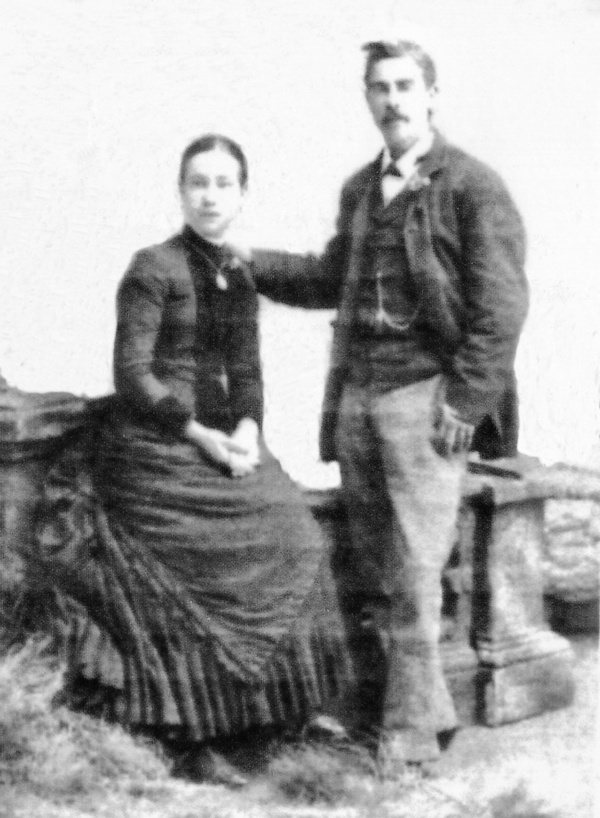 |
|
John Drew (John Bezer Drew's 2nd son) and his wife
on
their wedding day, 1891. |
Their first son, Thomas Bezer Drew, was born on the 12 February 1855
at Creswick, John Bezer Drew's occupation being given as a shoemaker. Creswick,
which is 75 miles north west of Melbourne, was then a growing gold-mining
town with a population of some
25,000.
Their second child, Elizabeth Charlotte Drew was born
― also at Creswick
― on the 10 August 1856, her father's
occupation now being entered as newsagent.
Between
1856 and 1858, the family moved 60 miles on to
Ararat, another gold-mining town, newly established, with a
population of some 9,000 within the area.
The map below shows the towns where the family stayed in
relation to Melbourne, to which they finally moved:
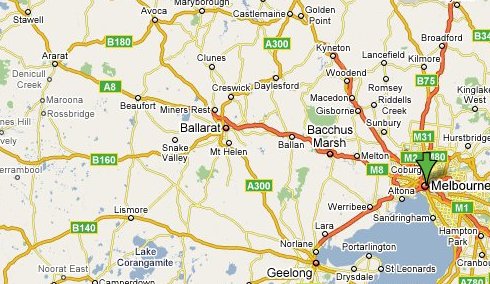
Their third child, John Drew, was born
at Ararat on the 25 March 1858 (John Bezer Drew now being listed as
a fruit vendor) followed by their fourth, Mary Burl Drew, on the 22
December 1859 (John Bezer Drew now being listed as a storekeeper).
Mary was to die in Ararat, aged just 13 months, from whooping cough
(1
February, 1861), her father then being described as a shoemaker.
During John Bezer Drew's time in Australia, he proved himself as
versatile (and, indeed, volatile) as during his earlier years in
London. Although he was never engaged in gold mining, he took
advantage of the job opportunities then opening up to work as, among
other things, a Newsagent, Commission Agent, Fruit Vendor, Letter
Deliverer and Newspaper Correspondent ―
indeed, it was noted later that during the early 1860's he was a prolific and witty
correspondent for the local Ararat Advertiser. In her
History of Postal Services
in Victoria (1984), Christine Gibbs' mentions that John Drew, an enterprising man, was a Town
Crier in Ararat, where he organised a Post Office Association. Members of the Association could have their letters delivered by Mrs
Drew and the family for a shilling per week.
Later in 1861, the family moved 18 miles from Ararat to Pleasant
Creek (Stawell), where Amelia Bezer Caroline Drew was born on the 21
September.
Whilst at Pleasant Creek, Bezer Drew was the representative of the
Ararat
Advertiser, as well as again diversifying his talents by offering to
write letters for residents, in confidence. One commentator referred
to him as being 'a very small stout man.' Politically he remained an
ultra-democrat by supporting John Woods (1822-1892) an engineer,
originally from Liverpool, and a member of the Legislative Assembly
(The Golden Years of Stawell, 1983). Woods had supported the
Anti-corn law League when in England, and in Australia remained
committed to democratic and radical principles.
The picture below shows Upper Main Street, Pleasant Creek (Stawell)
in 1866 with gold mines on a ridge in the background. The building
on the right with the awning is the office of the Ararat Advertiser
of which John Bezer Drew was a representative. Picture painted by
Robert Watchorn (Cover of The Golden Years of Stawell), from a
photograph.
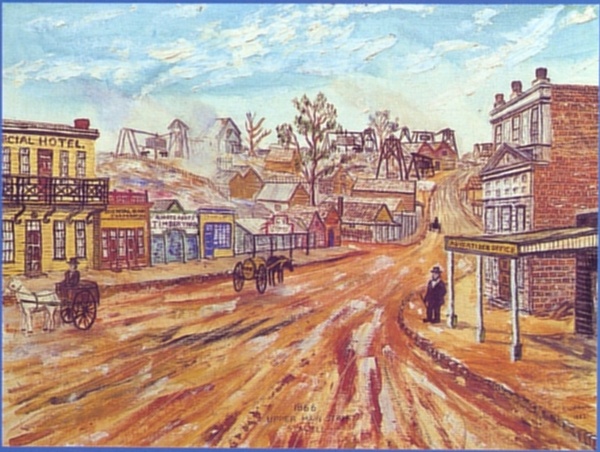
In 1863, the family was still in Pleasant Creek (Stawell) where
Susan Drew, another daughter was born, but died aged 3 weeks. An entry for 1864 gives the birth of a further daughter, Susan Drew,
who died at the age of 2 days.
The years of 1865 and 1866 resulted in another move, this time to
Carlton, a suburb of Melbourne, 150 miles from Stawell. Another son,
William Drew, was born there in 1865 but died after three days. The
following year, 1866, Frank Drew was born on the 20 September also
in Carlton, with John Bezer Drew now listed as a hawker.
Yet another move to the suburb of Emerald Hill (now South Melbourne)
was made, probably in 1867, where Susan Clara Drew was born at 18,
Little York Street, on the 15 June 1868. John Bezer Drew gave his
occupation as a general dealer.
The picture below shows the family at their home at 80 Coventry
Street, Emerald Hill, circa 1870.
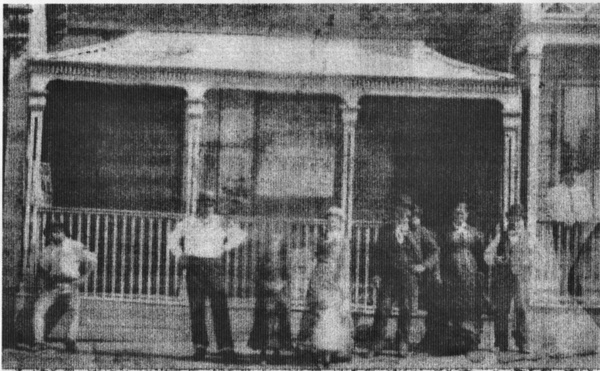
From right to left: John Bezer Drew; Wife, Elizabeth Drew; Son,
Thomas Bezer Drew; Elizabeth Charlotte Drew with Susan in front;
Amelia Bezer; Caroline Drew; John Drew; Frank Drew.
The family were to remain permanently in the Melbourne vicinity.
Another child, Ada Drew, was born in 1871 but died aged 1 day.
From this time John Bezer Drew became busily involved in public
affairs, both of a social and political nature. He had been active
in the Chartist scene up to the time he left England, and now that
he had settled in Melbourne his radical interests became more
prominent.
In 1872, he was a member of the Democratic Association of Victoria,
and a committee member of the Melbourne Eclectic Association. In
1874, he became a member of the Constitutional Reform League, as
well as a member of the Workingmen's Political Association.
During 1874, he gave several lectures, commencing with 'A
Political Creed for the Coming Election,' which he presented to The
Sunday Free Discussion Society at the Trades Hall, Carlton, on 28
February. This was followed by:
-
on 5 May, 'Women of the Bible' for
the Free Thought Debating Society ― with a
second lecture, by request,
on the 23 May;
-
on 27 June, 'The Autobiography of John Stuart
Mill';
-
on 10 October, 'The Comparative Merits of Deism
and Atheism';
-
on 26 December, 'The Fourth
Commandment' at the Free Thought
Discussion Society.
He continued in a similar vein throughout 1875, becoming a member of
the Progressive Land Tax League, the Victorian Protection League and
a committee member of the Total Abstinence Society, Melbourne, from
1875 - 7.
Through 1875, he continued lecturing for the Free Thought Discussion
Society. On the 20 March his subject was 'The Bible's Idol'
followed by 'Fear God and Honour the King' on the 17 July.
A sample of his public speaking was reported by the Melbourne Daily
Telegraph of the 15 October 1875, from a lecture he gave at the
Eastern Market on the previous day. His style was reminiscent of his
oratory during his Chartist days, examples of which were given in
Part One:
". . .
. Politics and political science should be essentially the study
of the workingman. The large landowners and other wealthy
monopolists had hitherto governed this colony and had taken care to
look after their own interests to the injury of the masses. And it
was time for the older men like himself who knew the poverty that
existed in England among millions of people through the monopoly of
a few to say to the young men of this colony: "Wake up! or the
abuses of the old country will come on you!" (loud cheering). The
unholy league of conspirators against the Berry Government had said
that they would give the people more than Mr Berry had promised, but
he ventured to assert that their career would be a perpetuation of
swindling. Notwithstanding the importance of Protection the great
subject for the people to address themselves to now was that of a
land tax so that the wealthy should bear their fair share of the
burden of taxation, and therefore he could not see anything more
just than the progressive land tax of John Woods." [John Woods was
the Member for Murat in the Legislative Assembly and a friend or
acquaintance from the 1860's.]
On the 10 November 1875, he became a foundation member of the
Spiritualist and Free Thought Association.
During 1876 he continued with his Association work, as well as
joining the National Reform League, concerning which and the
government of the time he wrote a letter ― with much of his old
recognisable radical chartist fire ― to the editor of the
Melbourne
Age newspaper:
'Sir - On the 10th April, 1848, a petition signed
― even according
to the authorised report of the appointed reviewers
― by at least a
million and a half of men, was presented to the English House of
Commons, having for one of its objects the enactment of Annual
Parliaments: and your issue of today, exactly twenty-eight years
afterwards, and published, some fourteen thousand miles from
Trafalgar Square, advocates the same measure for the colony. So in
this particular instance, and by a singular coincidence, "History
Repeats Itself". As your humble servant happened to be one of the
"Ragamuffins" of that date, will you permit me a word in your
valuable paper:
Long before what is termed, the present crisis, and before indeed,
payment of members became law, I urged at several public and other
meetings the advisability of annual parliaments on principle: and
surely, now we are cursed with an assembly of worse than incapable
―
blackguard, drunkard and unprincipled ― headed by a traitor leader,
and defying public opinion repeatedly and unmistakably expressed,
the people will wake up to the fact that one year is quite long
enough to be insulted and pleaded by people whom we handsomely pay
to represent us forsooth.
If yearly parliaments had been the law of the land, the scandalous
proceedings of the last few months would never have been attempted. The National Reform League should take this important subject up. I
breached the matter at their last meeting, but there was no visible
response. Now however "The Age" has spoken with no uncertain mood,
let me venture to hope that all good Democrats will rally to the
cry. An organised agitation should at once commence, and no
candidate returned at the next election unless he pledges himself to
support this (as our painful experience proves) necessary measure.
Annual parliaments will soon reform the Assembly, and a reformed
Assembly will soon reform the Council. The old motto "Short
reckonings make long friends" appears to apply as aptly to
politicians as it does to commercial place actions; more especially
as our government men evidently consider politics more governing for
place and pay.
Very well gentlemen, you pay yourselves most unblushingly, and just
as if you had paid yourselves once every month. So from henceforth
present yourselves once every year to your employers. If you have
been good and faithful, you will be most assuredly and gladly, aye
and gratefully be re-engaged: but if unprofitable, go as we will
have you no more.
Yours &
J.B. Drew.
Emerald Hill. 10th April. "
Victoria was the first of the Australian colonies in 1870 to
introduce payment of Members of Parliament. Graham Berry became
Premier of Victoria in August 1875, but retired the following October
when Sir James McCulloch assumed office. The General Election in
1877 saw Graham Berry again appointed. There was political
instability for many years, with clashes between the Legislative
Council and the Legislative Assembly.
Following his foundation membership of the Spiritualist and Free
Thought Association in 1875, John Bezer Drew was appointed Secretary
of the Association on the 23 April 1876. That year also, another
daughter died ― Amelia Bezer Caroline Drew, aged 14, died from Typhoid
Fever on 3 March at Emerald Hill.
Some of the lectures that he presented for the Association during
1876 had strong religious as well as political connotations:
-
'Satan in Parliament' on 12 February;
-
'The Holy Religion of
Spiritualism' at the Masonic Hall on the 11 March;
-
'Resurrection of
Christ' on the 15 April, and . . . .
-
'A Bungling Bundle of Bothering Old
Letters', 6 August.
Despite his radical opinions, he had remained basically true to the
views that he had developed during his early 'Dissenting' days.
In March 1878, Australia was stirred by the news of extreme heroism. A ship, the 'Loch Ard',
on passage from Gravesend, England, to
Port Phillip, Melbourne, with cargo, 54 passengers and crew, was off
course due to bad weather and was wrecked on a small
island off the Australian coast. Only two persons
survived; Eva Carmichael aged 18, and Tom Pearce, a 19-year old
midshipman. Pearce found the girl clinging to a spar, swam for
over an hour with her to the shore, and stayed in a cave with her overnight.
The following day he walked 2 miles to summon help, and returned to
Eva at the cave until rescuers arrived.
John Bezer Drew, impressed with this account of heroism, composed a descriptive poem to champion the hero, Tom Pearce.
This he
published ― by request
― placing it on sale, price One
Penny.
|
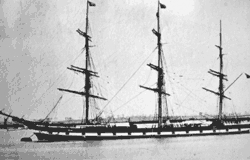 |
|
The clipper, Loch
Ard, wrecked on
Mutton Bird
Island, 1 June, 1878. |
|
TOM PEARCE,
The HERO of the Loch Ard.
____________
|
|
"Avast there, and don't make Tom proud,
To be sure, I was brave and what not;
And am pleas'd with your plaudits so loud,
But you pile up your praise such a lot.
God be praised for my precious good luck,
'Twas He gave me courage to save,
Thank heav'n for my strength and my pluck
That snatch'd one from a watery grave.
Who would not have tried as I tried?
My Captain, my shipmates, each one;
Those unfortunate heroes who died,
Had they lived would have done as I done.
And even the passengers too,
The sailors to boot, aye, and all;
I know that Miss Eva's true blue.
And would'nt have shrunk at my call.
A tear for the loved, who are lost,
A tear for the sadly bereft;
What agony, while tempest tost,
What agony, too, for those left.
The mothers, the sisters, the wives,
Ah! who can depicture their woe;
As they hear of the sweet priceless lives
Swept away by one terrible blow.
Aye, boys, 'twas a dreary long night,
For each moment anxiety brought;
As we looked out for land and for light,
Prayers, mingled with hopes, that were nought.
She struck on the ridge of a rock,
The life boats were got out, but ah,
No avail, for the waves seemed to mock
Every effort a poor soul to spare.
The papers will tell you the rest,
An Australian's not given to blow;
I am saved, I am happy, I'm blest,
Both saved, and a Saviour I know.
I thank you for all you have thought,
For all you have said and have done;
But my duty I did as I ought,
I plunged for her life and I won."
_____________
'Tis all mighty fine, Sailor lad,
Your estimate thus of an act;
Of your modesty, we are right glad,
But your bravery stands as a fact.
And we cannot, will not forbear,
Tho' your conscience we feel is your need.
We must tell the when and the where
You performed so heroic a deed.
All honour to Pearce then we cry,
To Tom Pearce belonging to us;
Who dared thus to do, or to die.
We'll praise him in prose and in verse.
For his, and her welfare, we pray,
Long life and all joy to the two;
But for him, an especial huzza!
Tom Pearce, the Australian true blue.
DREW, Emerald Hill.
Published by request
― Price One Penny. |
The two portraits below, taken about 1880 show John Bezer Drew and
his wife, Elizabeth. John Bezer Drew's left eye, that he mentioned
in his biography as being blind due to smallpox, can be clearly
seen, closed.
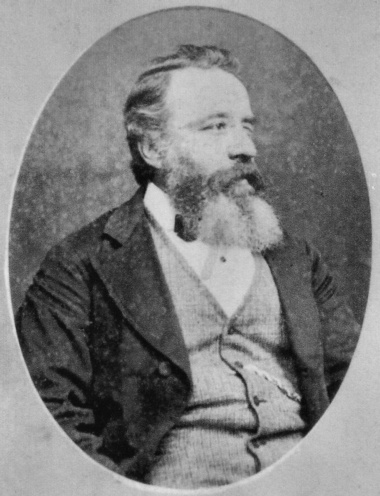
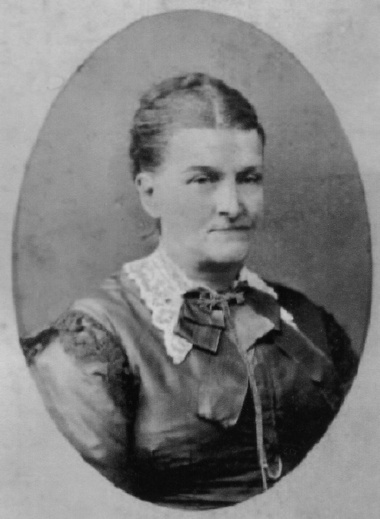
From the early 1880's, John Bezer Drew had become increasingly
religious. His daughter, Susan Clara Drew, had married and joined
the Salvation Army, becoming Major Barker. The following very
orthodox item is from The Salvation War (Victoria) 1883 and can be
compared to his own account as given in his biography and events
noted prior to his move to Australia:
"John B. Drew is an old man sixty-eight years of age, whose
conversion to God is another proof of the boundless love of our
wonderful Saviour. For forty-five years he had never bowed a knee to
God; but, instead, had been "a blasphemer, and a persecutor, and
injurious." But "the grace of our Lord was exceeding abundant with
faith and love, which is in Christ Jesus." "Howbeit for this cause he
obtained mercy, that in him Jesus Christ might show forth all long
suffering for a pattern to them which should hereafter believe on
Him to life everlasting." Thank God, the once infidel lecturer is
now a humble child of God. When a young man, he was a teacher, then
superintendent, of a Sunday-school, and a missionary to the Thames
seamen.
His mother was a godly woman, but his father was a drunken sailor. His minister was a proud young aristocrat, without the fear of God
in his heart. He induced young Drew and a few more of his
congregation to be immersed; and as they had no baptistry in their
chapel the minister borrowed a Unitarian chapel, and instead of the
usual address on adult baptism, he made an attack upon the
Unitarians who had loaned their chapel. This brought up rejoinders,
and young Drew and his companions went to hear the Unitarian
defence. They subsequently waited upon their own minister for
information upon doctrines which were assailed by the Unitarians;
but instead of tender dealing and clear teaching they were turned
out with denunciations. Two went off at once to infidel
lecture-rooms, while young Drew sought for ease to his troubled mind
by attending every church or chapel he could get in to until he was
chained up by Giant Despair; then he often contemplated suicide. He
took to drink, theatres, gambling-houses, and mixed up with every
ism save atheism. With hot tears he would often quote the words at
his baptism ―
|
When any turn from Zion's ways
―
Alas! what numbers do! ―
I think I hear my Saviour say,
"Wilt thou forsake Me too?" |
There was unrest and sometimes despair; but there was no real
repentance, no real prayer to God, no pleading for mercy, no
prostration at the cross. It was all human reason and argumentation. Years passed on, and the Chartist agitation began. Drew was then a
political and infidel stump orator. In 1848 , for a speech not
according to law, he received a sentence of two years in Newgate,
with eighteen months solitary confinement.
When liberated, he had to find bail for three years' good behaviour;
but this was soon forfeited through publishing a leading article in
a newspaper. He had to flee from England. He came to Australia, and,
according to his own statement, has been a willing slave of the
devil; "even he, surely, might be satisfied with forty-five years
undisguised treason against the King of kings."
He threw himself as an energetic worker into the band of public
blasphemers, and for has been in the front "railing" against Christ. But what led to his conversion? His good wife and daughter were
connected with the South Melbourne Corps, and they invited him to
the Salvation Army. But that he scorned
― "A philosopher go to the
Salvation Army! to look at a lot of lunatics and fools?" But they
pressed him frequently, and for peace sake he went three times to
the South Melbourne and twice to Collingwood. Good people asked him
if he were saved. "No! didn't want to be their way." Time slipped
on, and the New Year's Day demonstrations in the Exhibition was
held. His wife took him, and, to quote his own words, "Merciful God!
there were thousands of happy saints there, singing all about Jesus
and heaven; not is a Laodicean manner, but singing and meaning it,
with their hands and feet, and lungs; ah! and better, with their
hearts. Meaning it. Major Barker 'bound for the better land;' but
poor me, where was I bound to? O for my Sunday-school again! O for
the old-time religion again!
"That night I spent in bitter agony; nevertheless not repentant, but
savage. The next morning, at about nine o'clock, the blessed Lord
laid hold on me, and down on my knees I wept and prayed with groanings which cannot be uttered, my dear wife and child at mercy's
throne pleading. The enemy said, ' You think of mercy; why, you
fool, you have committed the unpardonable sin
― the sin against the
Holy Ghost. You can't be pardoned; go and get drunk; or do as Judas
did!' But I did neither. No more drink, no more sin; damned or not
damned, if I have to go to hell I'll just go praying
― praying to
the last gasp. So the sad day wore on, and the night and all the
next day, until the Friday afternoon. The last prayer I uttered was,
perhaps, the strangest ever made by a broken-down sinner. I remember
it well ― 'O trampled-on Christ! just pardon me, or don't; only do
tell, or I shall go stark mad!' A few moments after that
semi-blasphemous petition, when I felt that the devil himself would
come and damn me, light broke in.
|
"With pitying eyes the Prince of Peace
Beheld my helpless grief;
He saw, and oh! amazing love,
He flew to my relief. |
"The voice went through my delighted soul, 'Thy sins, which are many,
are all forgiven; go, and sin no more!' Gracious pardon full and
free! With stern command at once the wonderful Word of my neglected,
despised, rejected Jesus came with a mighty power, and the precious
blood was applied. 'How precious did that Christ appear the hour I
first believed!' Leaping up for very joy I shouted, 'Betty, I'm
saved! yes, saved; even me, saved! He has abundantly pardoned! Hallelujah!"
John Bezer Drew died on the 12 January 1888, aged 71, and was
buried at Carlton Old Melbourne Cemetery (Grave, Wesleyan Methodist
F 705). There is no headstone. He had suffered a
stroke a fortnight earlier at his daughter's home at Moray Place,
South Melbourne. His occupation was given as 'Bill-poster.' Elizabeth Drew, died
from tuberculosis at her daughter's home at Penshurst, Victoria, on the 9 January 1894,
aged 65.
Of his surviving children, John Bezer Drew's first son, Thomas Bezer
Drew became a noted political figure, representing North Ward
Ratepayers for 21 years. Elected twice as a counsellor, he became
Mayor from 1913-1914 and from 1924-1925, retiring in 1933.
His second son, John Drew, was an active member of the Protectionist
Association of Victoria (created 1894), an organisation that aimed to
promote industries and assist workers by means of a protective
tariff.
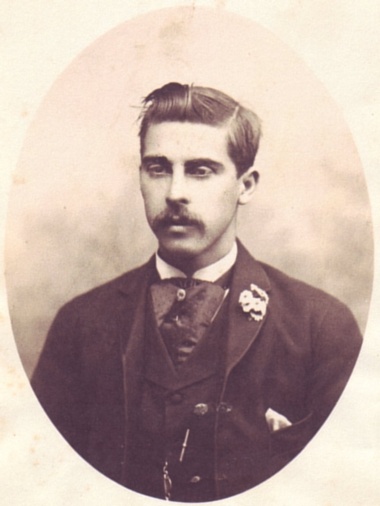 |
|
John Drew c.1900. |
This completes to date, the biographical information that is
available concerning John James Bezer (Drew). Although the
major events in his life have now been recorded, some queries
remain, as noted in Part One:
-
At the baptism of Emily Drew Bezer on 12 October 1859, her
parents were listed as John James Bezer and Jane Sarah Bezer of 9
Orchard Place, Shoreditch.
But in Australia, Mary Burl Drew was born in Ararat on the 22
December 1859, and John Drew signed as the informant on the 31
December.
-
According to the census record for 6 April 1861, Bezer was listed
then as being at 2A Old Bethnal Green Road, with his wife, Jane, and
two children.
However, John Bezer Drew's daughter, Mary, had died in Ararat on the
1 February 1861 from Whooping Cough after five weeks illness. The
informant was John Drew, Shoemaker, who registered it on the same
date.
Also, for the birth of Amelia Bezer Caroline Drew in Pleasant Creek
on the following 21 September 1861, John Bezer Drew was the
informant ― albeit with some delay
― on the 12 November.
It is therefore impossible that John James Bezer (Drew) could have
been in London on the date of Emily Drew Bezer's baptism. It is also
impossible that Bezer could have travelled the slow and long
distance from Ararat to London in the nine weeks between the 1
February and the 6 April 1861, the date of the census.
Lord Goderich had tracked Bezer to Australia, and presumably
received some knowledge of his remarriage that was passed on to John
Ludlow. A number of chartists had already emigrated to the
Australian goldfields. These included Henry Holyoake, the brother of
George Jacob Holyoake who, in 1853 was responsible with George
Black, a radical Chartist, for commencing in Melbourne, a paper The
Digger's Advocate. Information may have been obtained via them. It
would appear strange if Bezer's wife and family had not also learned
of it. Emily Drew Bezer's marriage certificate, dated 1868, as quoted
earlier, gave John Bezer as 'Deceased." Assuming that the 7 year
Presumption of Death of a missing person is taken into account, it
is very likely that Bezer's wife had obtained a surrogate, and would
confirm that Bezer had never returned to England. No remarriage,
death certificate or later census record of Jane Sarah Bezer has
been found following her witnessing the marriage of Bezer's son,
Francis James, in November 1862.
This comprises, so far, the more readily available information
concerning the life of John James Bezer (Drew). More material should
certainly be available in local newspapers of the period, where he
lectured in England, and also in Australian newspapers to which he
corresponded.
Remaining a staunch radical from his early Chartist days, he
continued in a similar idealistic manner in Australia by both
lecturing and writing, although much of his old fire had mellowed. Nevertheless, he undoubtedly left his mark both in England and
Australia by influencing local opinion. Perhaps if he had been less
restless and prepared to settle for longer periods, he would have
developed and focussed his literary abilities to a greater and more
positive extent. However, he will certainly remain as an interesting
outspoken reformist, his writings and reports of his oratory
reflecting most effectively a particular political and social tone
of his age.
―――♦―――
REFERENCES:
-
Charles Booth's notes for his
Life and Labour of the People of
London, a
selection digitised ― and online
― by the London School of
Economics.
-
Christian Socialist
Vols. I, II.
-
Golden Years of Stawell, by Robert Murray and Kate White, Lothian
Publishing Co. Pty. Ltd, Melbourne, 1983.
-
Harney Papers, ed. Black & Black, Assen, 1969.
-
History of Postal Services in Victoria. Christine Gibbs, Australia
Post,
1984.
-
John Ludlow. The Autobiography of a Christian Socialist, ed.
A. Murray, London, 1981.
-
Life of the First Marquess of Ripon, by Lucien Wolf, London, 1921.
-
Melbourne Age, as cited.
-
Melbourne Daily Telegraph, as cited.
-
Northern Star, 23 September, 1848. Trial of the Chartist Prisoners.
-
Northern Star, 27 April 1850. Meeting at the South London
Chartist Hall. The Northern Star also has short references during
his political period.
-
Northern Star, 12 October, 1850. Treatment of Political Prisoners.
-
Reynolds' Weekly Newspaper as cited.
-
Star of Freedom as cited.
-
The Salvation War. Victoria, Australia, 1883.
-
The Times as cited.
-
See also the biography of
Gerald Massey.
ACKNOWLEDGEMENTS:
. . .
. to Norman W. Drew of Victoria, Australia, for
information and photos, and to Linda Hull for document research in
the UK.
|